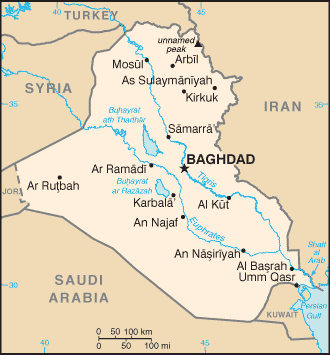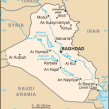Iraq’s Jaysh al-Muslimin – Nationalists in an Islamist Resistance Movement
Publication: Terrorism Focus Volume: 5 Issue: 39
By:

A recent interview with the spokesman of the Jaysh al-Muslimin in Iraq elicited mixed reactions from jihadi forum participants, many of whom commented on the issue of nationalism vs. Islamism as the focus of the Iraqi resistance (yaqen.net, November 5; hanein.net, November 6).
The spokesman of the Jaysh al-Muslimin, Dr. Ahmad Azziddin, identifies the group as part of “The Jihad and Change Front” (JCF, formed in September 2007), operating within an Islamist and nationalist framework to expel U.S. forces, liberate Iraq and erect a just and patriotic Iraqi government. The Jaysh al-Muslimin is an Islamic-nationalist movement with no affiliation to any political party. According to the JCF website, Jaysh al-Muslimin has many military, political, media, administrative and weapons development units, all reporting to a general staff that runs military activities in coordination with an intelligence unit (jhadfront.com). The core of Jaysh al-Muslimin is composed of ex-Iraqi military officers and scientists involved in training and supervising Iraqi volunteers. Jaysh al-Muslimin releases almost daily communiqués describing successful attacks against Coalition forces and claims the destruction of hundreds of U.S. tanks and armored vehicles using roadside bombs.
Asked whether the Jaysh al-Muslimin has a political agenda parallel to its military objectives, Azziddin said the group has a political and military agenda in conformity with JCF programs, capable of prevailing over the enemy and winning the support of the populace. Although the JCF considers the tribal Awakening Councils an American apparatus aimed at confronting the growing Iraqi resistance to occupation, it doesn’t regard all members of the councils as national traitors, treating them instead as honest Iraqis manipulated into joining the councils. The JCF has, on many occasions, called on the Awakening fighters to return to the ranks of the nationalist resistance. Concerning the security pact between the Iraqi government and the United States that will allow the presence of U.S. occupation forces through 2011, Azziddin said the Shura council of the JCF obtained a copy of the agreement and, after thorough examination, rejected the agreement on the grounds that it mortgages Iraq to the United States by legitimizing the prolonged occupation of Iraq.
According to Azzidin, the expulsion of Christians by Islamist extremists from the northern Iraqi city of Mosul is unacceptable to the JCF. Azziddin also accuses northern Iraq’s Kurdish peshmerga militia of trying to destroy the social, religious and geographical infrastructure of the nation. Azziddin believes that the Iraqi government and U.S. forces perpetrate dubious acts against the Iraqi people and blame the resistance movements, but Iraqis are well aware of such acts; “When John Negroponte came to Baghdad, one of his major missions was to penetrate and distort the Iraqi resistance through the killing, kidnapping and looting of innocent people, [which is] committed by mercenaries backed by the government militias. We dealt with these incidents professionally and exposed them” says Azziddin.
Jaysh al-Muslimin and the other groups of the JCF stand firm against the so-called Islamic State of Iraq (ISI), according to Azziddin, who emphasizes that the announcement of the ISI led to further divisions in the Iraqi resistance, disrupting jihadi efforts against the occupiers. Existing resistance groups began to unite in response; “We absolutely reject ISI’s extreme approach. We also don’t recognize the current Iraqi government because it’s a creation of the occupiers and dealings of any kind with it are unacceptable. Recognition of the legitimacy of the Iraqi resistance must precede any dialogue with the occupiers.”
Finally, Azziddin addresses his comrades in the resistance; “I say to my brother Jihadis, who created heroic epics against the biggest tyrant ever known to humanity in Mesopotamia, to rise and prepare for the bigger confrontation with the enemy. To be able to expel the treacherous enemy from our land, we must unite our ranks and be loyal to the cause and merciful amongst each other.”
Comments that were made during the Azziddin interview and later posted in jihadi websites such as hanein.net, weren’t all in favor of the Jaysh al-Muslimin. A frequent contributor to jihadi forums, nicknamed Abu Omar al-Kurdi, implicitly criticized the nationalist approach of the insurgent group by saying; “We previously said there are those who are fighting within the nationalist framework and not the Islamist.” Others rejected Azzidin’s rhetoric as nationalist, wondering why the JCF, which endeavours to create a Caliphate state, allows such groups within its ranks. In addition to the Jaysh al-Muslimin, the JCF is comprised of the 1920 Revolution Brigades, al-Rashidin Army, the Islamic Movement of Iraqi Mujahidin, al-Rahman Soldiers, al-Dawa wa’l-Ribat Brigades, al-Tamkeen Brigades and the Muhammad al-Fatih Brigades.




